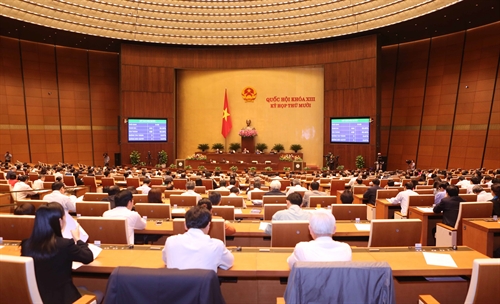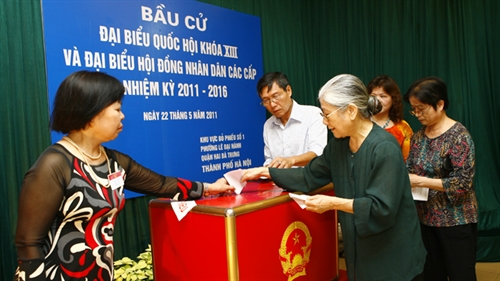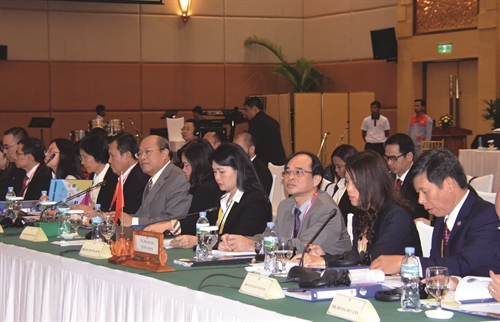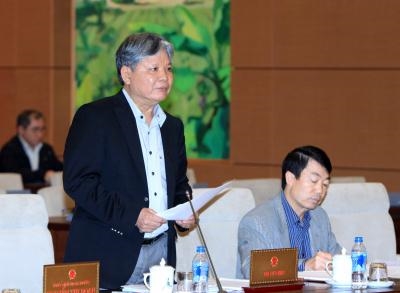The revised Law on Administrative Procedures (the Law) will enter into force on July 1 this year and replace the 2010 version.
Composed of 372 articles arranged in 23 chapters, the Law prescribes fundamental principles in administrative procedures; tasks, powers and responsibilities of procedure-conducting agencies and persons; and rights and obligations of procedure participants and related entities. It also establishes the order and procedures for instituting lawsuits, settling administrative cases, executing administrative judgments and settling complaints and denunciations in administrative procedures.
 |
| The National Assembly passes the Law on Administrative Procedures on November 25, 2015__Photo: Phuong Hoa/VNA |
The Law has been created to ensure the feasibility, democracy, publicity and equitableness of administrative procedures, and create favorable conditions for procedure participants. On the other hand, it aims at elevating responsibilities of agencies, organizations and individuals for administrative procedural activities.
Upholding the adversarial process in trial
The 2013 Constitution states that the adversarial principle must be guaranteed in trials. Concretizing this principle, Article 18 of the Law says the court must guarantee the exercise by involved parties and their defense counsels of the right to adversarial process in first-instance, appellate, cassation and reopening trials. This Article further states that involved parties and their defense counsels may collect and produce documents and evidence after the court accepts the administrative case and they must notify one another of such documents and evidence. They may present their arguments, counter-arguments and viewpoints on the assessment of evidence and applicable law to defend their claims and lawful rights and interests or reject claims of others. The Law also requires that in the course of trial, all documents and evidence must be examined in an objective, comprehensive and public manner. The court is responsible for administering the adversarial process, raising questions about unclear matters and basing itself on adversarial results to make judgments and rulings.
Settling administrative cases involving foreigners
Given the country’s deeper and deeper integration into the world, the Law devotes a chapter governing the settlement of administrative cases involving foreign elements.
This chapter creates a legal mechanism for protection of lawful rights and interests of overseas Vietnamese citizens, foreigners, foreign agencies and organizations, branches or representative offices of foreign agencies and organizations, and international organizations or their representative agencies in Vietnam.
Under the Law, an administrative case involving foreign elements means a case in which:
- An involved party is a foreigner, foreign agency or organization, branch or representative office of a foreign agency or organization, or an international organization or its representative agency in Vietnam;
- An involved party is an overseas Vietnamese citizen;
- The administrative legal relationship is established, changed or terminated overseas; or
- Overseas assets are involved.
Foreign entities in Vietnam have the right to file lawsuits at a Vietnamese court to request review of administrative decisions or administrative acts which they believe are illegal and infringe upon their lawful rights and interests. When participating in administrative procedures, they have all procedural rights and obligations like Vietnamese entities. They may also seek assistance from lawyers to defend their lawful rights and interests in accordance with Vietnamese law.
Based on the principle of reciprocity, the Vietnamese State is entitled to restrict relevant administrative procedural rights of foreign entities if the courts of their countries have done the same to Vietnamese citizens, agencies and organizations and branches and representative offices of overseas Vietnamese agencies and organizations.
The legal capacity of a foreign agency or organization for participating in administrative procedures will be determined in accordance with the law of the country where it is established. For a Vietnam-based branch or representative office of a foreign agency or organization, it will be determined in accordance with Vietnamese law. For an international organization or its representative agency, its legal capacity will be determined under the treaty based on which such organization is established, its working regulation, or the treaty to which Vietnam and such organization are contracting parties. If the international organization declares to waive its privileges or immunities, its legal capacity will be determined in accordance with Vietnamese law.
Regarding administrative cases involving foreign agencies, organizations and individuals and international organizations eligible for diplomatic or consular privileges and immunities under Vietnamese law or treaties to which Vietnam is a contracting party, they will be settled through diplomatic channel, the Law says.
Summary procedures
Settling administrative according to summary procedures is a new content of the Law.
According to Article 246, a case will be settled according to summary procedures when fully satisfying three conditions below:
First, its circumstances are simple with sufficient and clear documents and evidence for the settlement, without requiring the court to collect additional documents and evidence;
Second, involved parties have clear addresses of residence and working offices; and
Third, none of involved parties resides overseas, unless the involved party residing overseas agrees with the involved party in Vietnam to request the court to settle the case according to summary procedures.
Within 30 days after accepting a case, the judge assigned to settle the case will issue a decision to settle the case according to summary procedures and open a court hearing for trial within 10 days after issuing such decision.- (VLLF)







